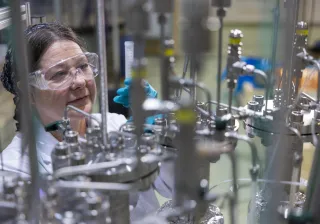As the world moves towards low-carbon fuel solutions, the number of power plant boilers combusting biomass or recycled fuel steadily grows, with more than one thousand biomass boilers in Europe alone. Biomass boilers use various fuels, such as forest residue, wood and recycled wood, as well as agricultural crops like straw and other waste to energy materials.
One of the most serious problems biomass plants face is severe corrosion. In biomass boilers, corrosion comes from burnt fuels containing alkali metals, chlorine and other corrosive elements, and causes material wastage, tube failures, tube leakages, and a shorter boiler tubing lifetime. Worst-case scenario, corrosion leads to the emergency shutdown of your boiler, bringing huge economic and safety repercussions.
How can corrosion best be tackled?
Corrosion can be slowed or even prevented in power plant boilers. One way is to limit maximum temperatures and steam pressure. However, bringing down your plant’s heat and electricity production capacity will, by definition, lower its overall efficiency and profitability.
Chemical additives, like sulphur compounds, or tube material selection are other possible ways to slow or even prevent corrosion. However to my mind the most cost effective and reliable way to tackle corrosion is through nickel- and iron-based HVOF protective coatings. These high-alloyed materials can be applied typically as weld overlays or thermal spray coatings to increase the corrosion resistance of the lower cost load carrying base tube.
Coatings to prevent corrosion
Backed by our long experience in thermal spray coatings, we’ve helped clients to select the most suitable commercially available materials or produce experimental powders to suit specific plant conditions. We can also optimize the coating parameters, especially for high velocity thermal sprays, and test them in harsh high-temperature corrosion conditions – both in laboratory simulations or in actual power plant conditions.
Coatings can be evaluated to perform on a scale from sufficient to excellent in conditions simulating biomass and recycled fuel combustion and in actual furnace conditions, as long as they are dense, well adhered to the substrate and their composition is accurately selected for the prevailing conditions.
As a case in point, thermally sprayed coatings in the EU project, NextGenPower, were evaluated both in molten salt tests in a laboratory and by corrosion and material assessment probes in one of the world’s largest biomass co-fired fluidized bed boilers in Pietarsaari, Finland. Optimization of the coating structure and fabrication of high-quality coatings was a key part of securing the high corrosion-resistant coatings that were developed as a result of this successful experiment.
I personally performed a public defence of this research in my dissertation. The coating experience and know-how that came from the NextGenPower case has been brought into the VTT ProperScan® service for your benefit, to help you avoid production losses, minimize risk, and increase the lifetime of your plant components, even in extreme temperature conditions.
Read more about VTT ProperScan® or my dissertation.
VTT ProperScan® enables you to define the current status of your plant or its single components. Due to extreme conditions, phenomena such as corrosion, erosion or wear may cause failures that can be difficult to predict. ProperScan® helps predict how to react to changes in your operating environment and how risks can be monitored and controlled. With the help of ProperScan® services, you gain information on e.g. how long your plant can be operational with the present parameters and when to perform the needed repairs in the plant.
With ProperScan® you can:
– extend the lifetime of plant components
– have uninterrupted and safe operations
– reduce economic risks at system level




